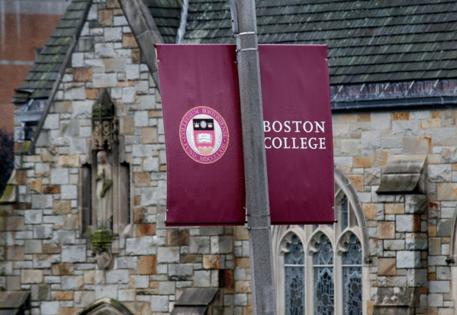Boston College refuses to pay PILOT cash as mayor's tax split up for a vote
Published in News & Features
BOSTON — Boston College is flat-out refusing to own up to the $4.8 million overdue bill in the city’s volunteer PILOT tax program, saying the institution vigorously guards its “tax-exempt status.”
The Chestnut Hill school instead makes “annual payments for fire protection services” to Boston and Newton and offers “community benefits,” as do other Hub schools — but no cash payments.
“As a non-profit educational institution and a religious affiliate, Boston College chooses not to participate in the voluntary PILOT program so as not to relinquish the tax-exempt status afforded to educational and religious entities,” BC spokesman Jack Dunn told the Herald in an email Tuesday.
BC only scores 23% when compared to other PILOT participants with a $434,777 cash contribution, according to city records. That likely applies to the payment for fire coverage.
Dunn confirmed that amount saying “BC pays $441,000 to Boston under an agreement since 1995; $134,000 to Newton.”
The city has left the “community benefits” entry blank for BC, but Dunn said the school does participate, offering “$40 million in community benefits … each year through scholarships and financial aid, volunteer outreach, community grants, and the public and private funding we procure for Boston’s public and parochial schools.”
Dunn added BC gets “$0 credit for community benefits because we do not participate in the PILOT program.”
The mayor’s office did not immediately respond to the discrepancy.
Steve Murphy, former city councilor and now Suffolk Register of Deeds, said he helped then-Mayor Thomas Menino broker the PILOT deal in 2012 to help lift the burden off taxpayers. He said those who are not paying their full share, as the Herald reported Tuesday, need to be held accountable.
“We need to hold their feet to the fire,” Murphy said. “It’s an embarrassment. They don’t pay for plowing, police … the only way to get them to pay is to give them a scarlet letter.”
He said it’s all about “fairness to Boston taxpayers.”
The City Council Tuesday quickly raised the underperforming PILOT program as part of Mayor Michelle Wu’s home rule petition to hike commercial tax rates over residential ones to help out homeowners. The mayor’s representatives said negotiations are still taking place to possibly update the program.
Wu’s tax plan has drawn criticism for burdening a struggling commercial sector dealing with falling property values and vacant office space, and for the mayor’s rejection of calls to instead look to cut a $4.6 billion city budget that grew by 8% this fiscal year.
The latest version of the tax split includes the lower maximum shift of 181.5% that was recommended by four business groups, rather than the 182% Mayor Michelle Wu had initially included in a draft petition she had been circulating over the weekend.
The Wu tax plan could be up for the vote Wednesday at the council and then must make it through the state Legislature.
Enid Eckstein, co-chair of PILOT Action Group, also spoke up in the Council meeting saying nonprofits are getting off easy.
“Many of these institutions are sitting on billions in endowments while many of our neighborhoods struggle. It is time the city and residents call upon these institutions to step up and provide a reliable source of revenue to the city,” she told the Council. “While these institutions welcome people from all over the globe, it is Boston taxpayers who bear the burden of providing the tax subsidy.”
--------
(Gayla Cawley contributed to this story.)
--------
©2024 MediaNews Group, Inc. Visit at bostonherald.com. Distributed by Tribune Content Agency, LLC.







Comments